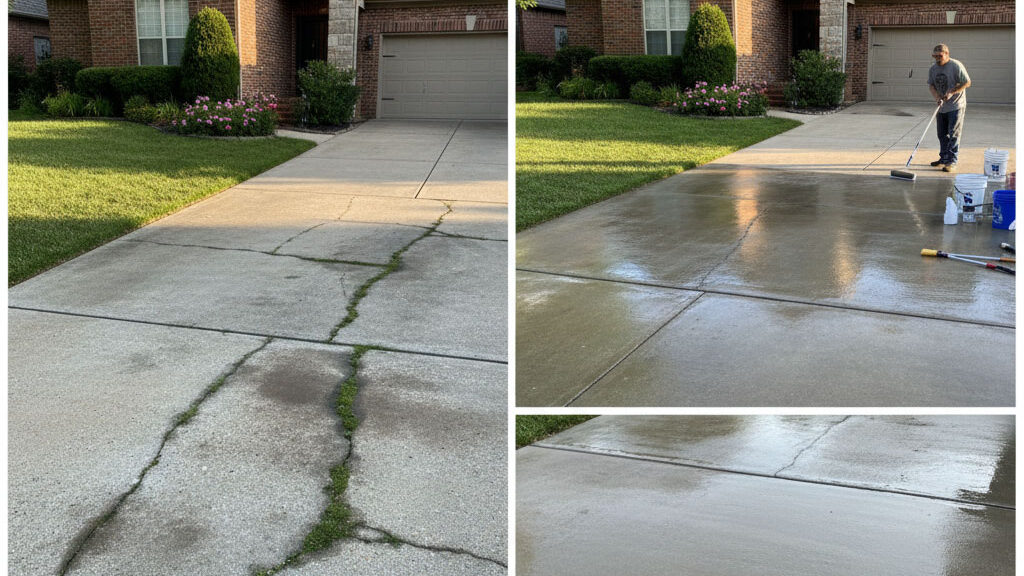
Concrete driveways are a durable and popular choice for homeowners, offering strength and a clean, polished look. However, without proper sealing, concrete is vulnerable to stains, cracks, and weather-related damage. Sealing protects your driveway, extends its lifespan, and keeps it looking attractive over time.
Proper maintenance of concrete driveways starts with sealing. This simple step ensures long-term performance and prevents costly repairs, making it a crucial investment for any property.
How Sealing Prevents Water Damage
Water is one of the main causes of concrete deterioration. Rain, snow, and even sprinkler systems can seep into porous surfaces, causing long-term problems if left untreated.
- Blocks moisture penetration that can weaken the concrete.
- Prevents freeze-thaw damage during winter, reducing cracking.
- Protects against erosion of surface materials.
- Minimizes puddles and standing water that cause stains and damage.
Sealing creates a barrier that keeps water out. This significantly reduces the risk of structural damage caused by seasonal weather changes.
Why Sealing Helps Resist Stains
Driveways are exposed to vehicles, oil spills, dirt, and chemicals. Concrete is naturally porous, which makes it prone to staining.
- Prevents oil and grease from soaking in.
- Reduces dirt penetration for easier cleaning.
- Protects against rust and chemical stains.
- Maintains the driveway’s aesthetic appeal.
A sealed driveway is easier to maintain and keeps its appearance longer. This helps preserve your property’s curb appeal and resale value.
How Sealing Reduces Cracking and Surface Damage
Over time, concrete can develop cracks due to stress, weather, or heavy loads. Sealing strengthens the surface and reduces the risk of damage.
- Provides a protective layer that absorbs minor impacts.
- Reduces shrinkage-related cracks during curing or drying.
- Prevents surface scaling from exposure to salt and ice.
- Limits the effects of UV rays that can weaken concrete.
Sealing acts as a preventive measure that keeps your driveway intact. Regular application minimizes the need for costly repairs or replacements.
Why Maintenance Becomes Easier with Sealed Concrete
A sealed driveway requires less effort to clean and maintain compared to unsealed concrete. Dirt and debris are less likely to stick to a smooth, protected surface.
- Simplifies pressure washing and routine cleaning.
- Reduces the need for frequent patching or repairs.
- Prevents the growth of mold and mildew in damp areas.
- Keeps the driveway looking new longer.
Regular sealing reduces maintenance time and expenses. It allows homeowners to enjoy a functional and visually appealing driveway without constant upkeep.
When and How to Seal Your Driveway Properly
Proper sealing requires the right timing, materials, and technique. Doing it incorrectly can reduce effectiveness and lead to premature wear.
- Seal when the concrete is fully cured (usually 28 days after installation).
- Clean the surface thoroughly before applying the sealer.
- Choose a high-quality sealer suited for your climate and usage.
- Reapply every 2–3 years or as recommended by the manufacturer.
Following best practices ensures the sealing layer performs optimally. This prolongs your driveway’s lifespan and maintains its appearance.
Protect Your Concrete Driveway with Proper Sealing
Proper sealing is essential for protecting concrete driveways from water damage, stains, cracks, and daily wear. It preserves strength, improves appearance, and reduces long-term maintenance.
Investing in professional sealing or regular DIY maintenance ensures your driveway remains durable, safe, and visually appealing. A well-sealed driveway is a long-term investment in your property’s value and functionality.

